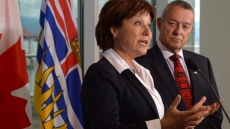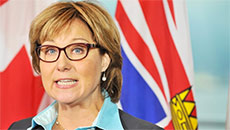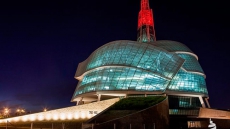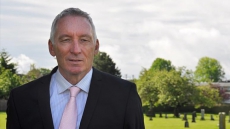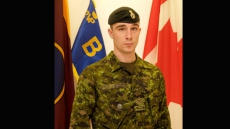OTTAWA - Prime Minister Stephen Harper denounced Monday the widely held view that fearsome new militants in Iraq and Syria have a "root cause" — a stark characterization that questions the reason for his foreign minister's recent trip to Iraq.
In a speech to party faithful, Harper unequivocally branded the al-Qaida splinter group known as the Islamic State of Iraq and the Levant, or ISIL, as "evil" and "vile," saying it must be opposed.
Harper also reaffirmed the Conservative government's unwavering support of Israel "through fire and water" as he linked the fight against ISIL's extremism to Canada's support for the Jewish state.
Harper also blasted Russian President Vladimir Putin for his continued aggression in Ukraine, and pledged that Canada would loudly brandish its pro-Ukrainian solidarity later this week when President Petro Poroshenko visits Parliament Hill.
Harper's tough foreign policy rhetoric punctuated his speech to Conservative supporters to mark the return of the House of Commons from a summer recess. It also serves as a harbinger of what's to come when he speaks to the United Nations General Assembly next week in New York City.
But Harper's earnest denunciation of ISIL puts distance between himself and Foreign Affairs Minister John Baird, who recently travelled to Iraq to bolster a new central government struggling to contain the new Islamist insurgency.
"Canadians are rightly sickened by ISIL's savage slaughter of anyone who doesn't share their twisted view of the world. We know their ideology is not the result of 'social exclusion' or other so-called 'root causes,'" Harper said, sparking mild laughter.
"It is evil, vile, and must be unambiguously opposed."
That characterization lacked the nuance that Baird offered just hours earlier in a call from Paris, where he was attending an international conference of diplomats from around the world gathered to plot strategy against ISIL.
The Paris conference was hosted by French President Francois Hollande and Iraqi President Fouad Massoum, whom Baird visited last week in Baghdad.
Baird travelled to Baghdad and the northern Iraqi capital of Irbil to deliver a message of tolerance and inclusion to a new Iraqi government that was sworn in last week. The opposition NDP and Liberal critics, Paul Dewar and Marc Garneau, shared that view while travelling with Baird.
New Iraqi Prime Minister Haider al-Abadi last week succeeded Nouri al-Maliki, who was forced to step down after eight years.
Baird and many others have criticized al-Maliki for promoting a pro-Shiite agenda that alienated Iraq's Sunni minority — a disenfranchisement that many cite as one the so-called root causes for the rise of ISIL.
Baird said Monday that even though it is early days, he is seeing signs that al-Abadi is building a more inclusive government.
"I was pleased to hear the comments by the president and the new minister of foreign affairs. I was also struck by the spirit in the room, particularly from the Sunni Arab neighbours of Iraq who are hugely encouraged by what they're seeing coming out of Baghdad."
He said it was important for the new Iraqi government to win the "hearts and minds" of Sunnis and other minority groups.
Baird was unequivocal about the recent beheading of British aid worker David Haines, likely by a fellow countryman-turned-terrorist, calling it a horrific atrocity.
Baird said Monday the circumstances surrounding Haines's death underscore the need to curb the influx of foreign fighters from western countries who are joining ISIL.
"I think that there are people fighting from some 50 countries, likely from virtually every country from around the table this morning. Obviously we all want to do more," Baird said.
"For all of us, including my British counterpart, the fact that a development worker from the United Kingdom was most probably beheaded by another citizen of the United Kingdom was probably the most horrific thing we've learned in this battle."
Haines's videotaped murder, at the hands of a masked ISIL killer who spoke with what sounded like a British accent, has heightened the sense of urgency for a co-ordinated international response to its threat. The militants have seized swaths of land across parts of Iraq and Syria.
The new Iraqi premier said Sunday in televised remarks that he was giving France approval to use Iraqi airspace. As the conference opened, a pair of French reconnaissance jets flew sorties over Iraq.
Baird reiterated the need for a united international response to ISIL, which he calls a threat to global security. "We must not surrender this moment," he said.
Baird said Canada will conduct military airlifts out of the Czech Republic to supply Kurdish fighters in northern Iraq with arms and ammunition.
Canada has also committed dozens of special forces troops to advise northern Iraq's Kurdish Peshmerga fighters who are leading the ground offensive against ISIL.
Harper has said Canada will not send combat troops.
The opposition NDP and Liberals are calling for a full parliamentary debate on the deployment of troops to Iraq.
